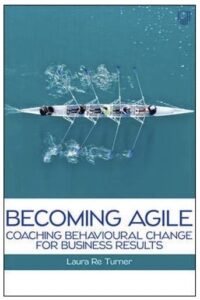

I was able to attend AgilityLab’s Meetup on 28th January featuring Shane Hastie of ICAgile. He presented a draft code of ethics for Agile Coaches which is being held at Agile Alliance.
After asking us to contribute to a word cloud to understand what we think of when we think of the word ‘ethics’ (I said ‘respect for the client’ and ‘honesty’), Shane showed the list of 18 points in the proposed Code of Ethics. He said it made more sense for the Agile Aliance to own it than for ICAgile because ICAgile is a standards organisation for training courses and contributes to professional skills development through its Learning Outcomes. (My company Future Focus Coaching is an ICAgile Member Organisation.)
While there are almost half a dozen professional training organisations globally, Shane used as a benchmark the Code of Ethics of the International Coach Federation (ICF). I’m a member of APECS, the Association for Professional Executive Coaching and Supervision, which has its own Ethical Guidelines.
Shane asked small groups to discuss the idea of a code of ethics in breakout rooms. Some points we raised in our room were:
- We are being most ethical when we are being true coaches, and not teaching (telling).
- We don’t always have a choice of how we help the sponsor roll out their agile framework. We arrive, and the sponsor tells us what has been decided, regardless of what the teams want or need.
In the plenary session, people from other breakout rooms said the points they raised were:
- Some people perceive the role Agile Coach as another term for a Scrum Master. They’re different, and a coach should adhere to a different professional standard.
- One should always have been a Scrum Master before becoming an Agile Coach, so that they understand the ins and outs of how Agile teams work. Someone else added: what about Product Owners?
- Agile Coaches have many roles, as a true coach but also an evangelist, and partnering with management. It’s a difficult position to be in. People aren’t always aware of what role they’re in at a given time.
- Some external coaches say ‘if you implement x framework, you’re agile’. People are trying to sell their preferred Agile process instead of working to the client’s agenda.
But the over-arching reason I think we need an ethical code for Agile Coaches is this. More people who identify as Agile Coaches have increased their professional coaching skills significantly during the last five years at least. When I spoke to Isaac Garcia, an organiser of Coaching Agile Journeys, in January, he said their members have matured in their use of coaching practices during the last six or so years. And they are increasingly looking for ways to learn at a more mature level, from CAJ. (Isaac said CAJ was started by Lyssa Adkins after her book Coaching Agile Teams was released 20 years ago as a learning group for people to practice what they’d learned.)
Some of the coaching approaches and themes I’ve seen arise in this space in recent years:
- psychological safety
- Open Space
- Liberating Structures
- Use of NLP
- Somatic coaching
- Solution focused coaching
- High-quality facilitation
So if Agile Coaches are using more professional coaching skills among the four competencies then professional coaching standards and continuing professional development should apply.
Related posts
Ready to get started? Contact us. We’ll respond within one business day.

